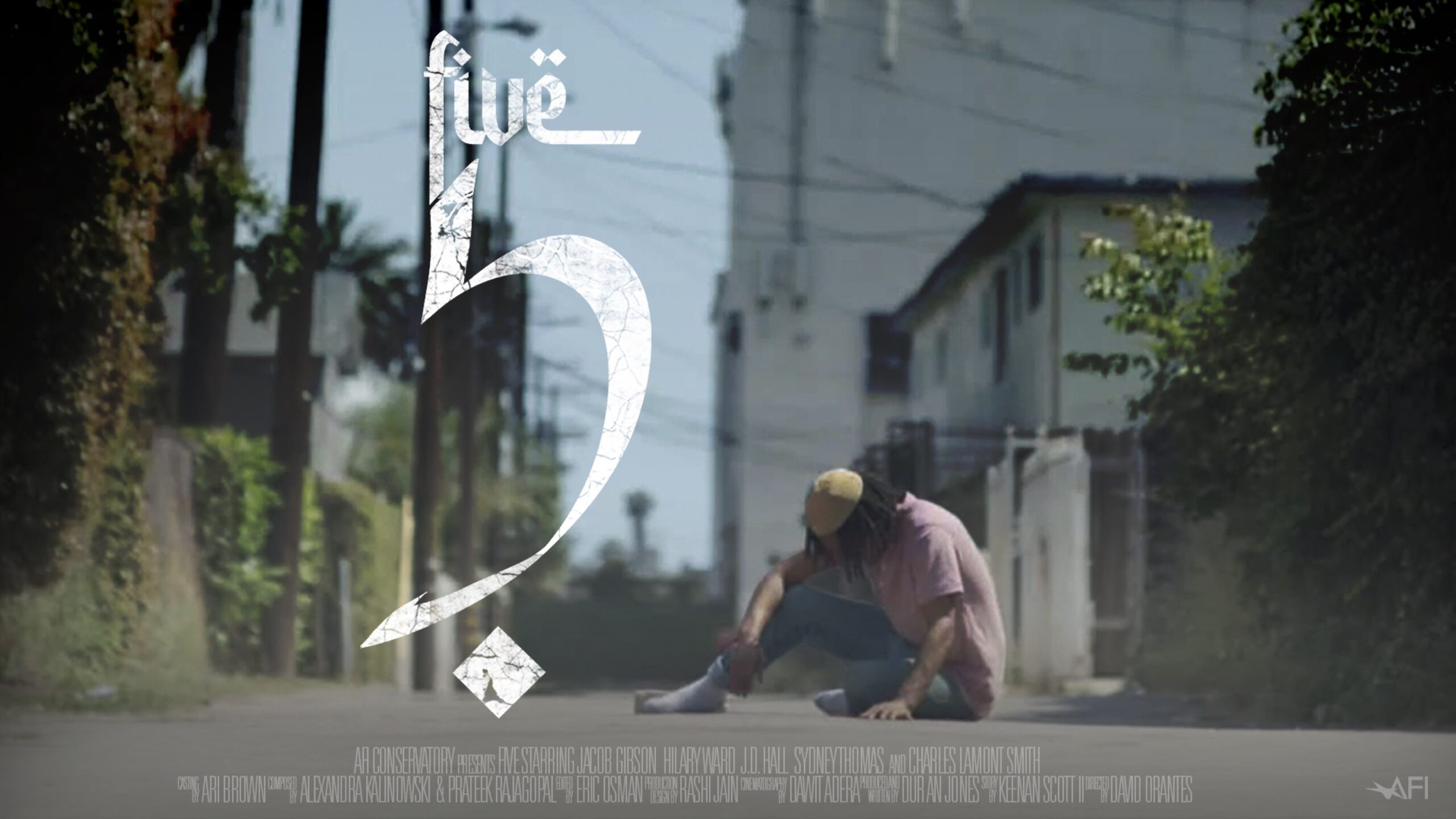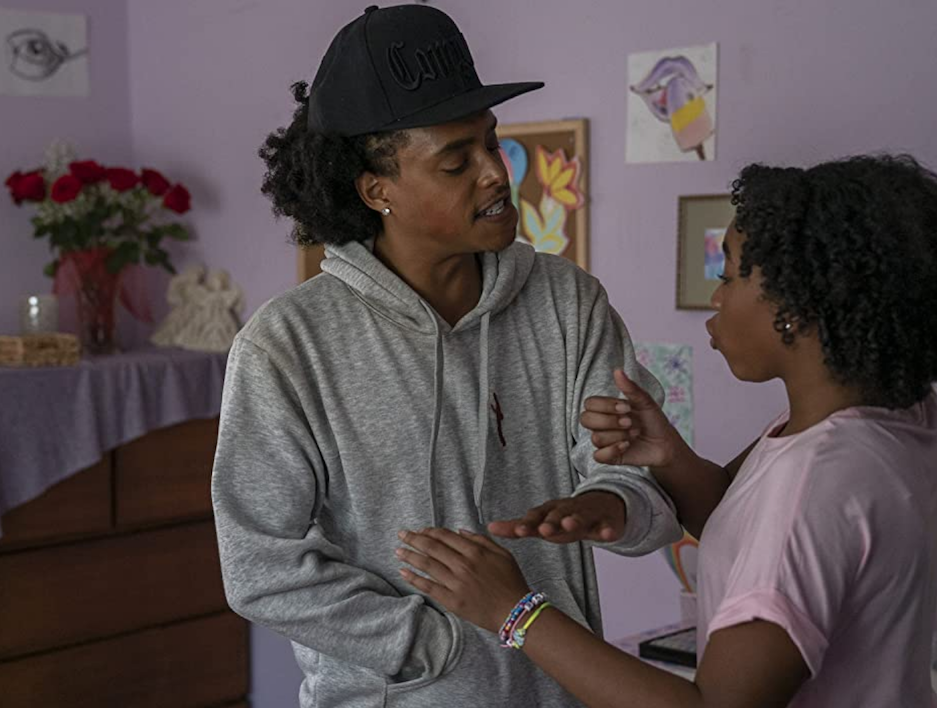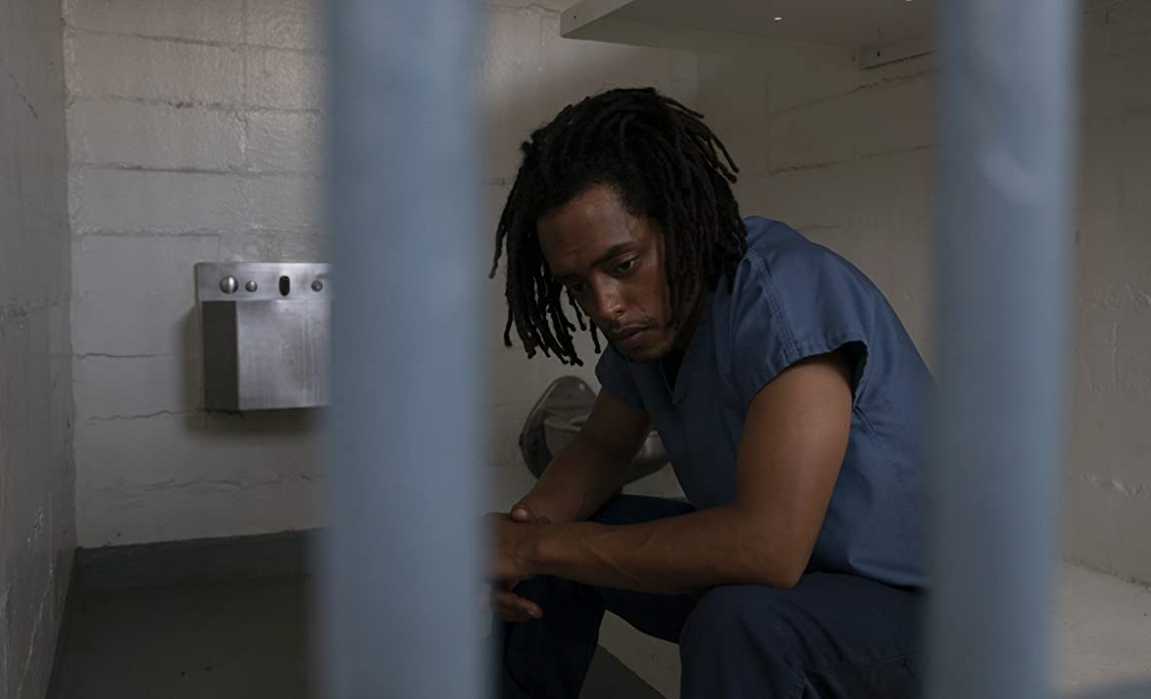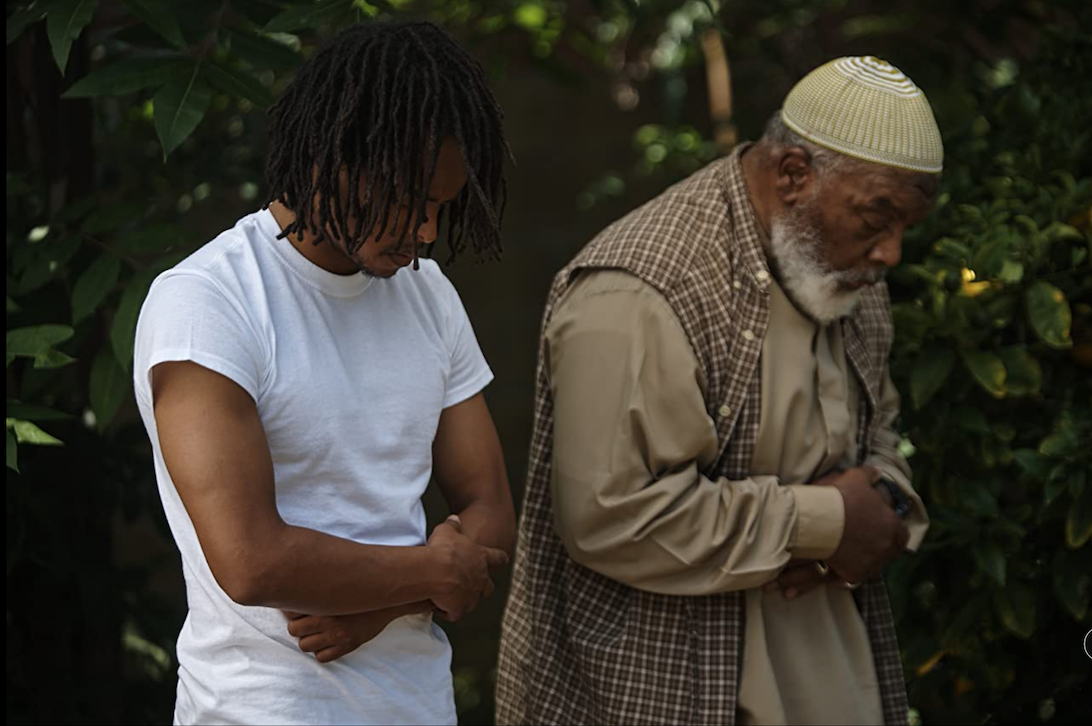Everyone has a past and sometimes it can follow you around like a Scarlet letter. You’re not the same person but society refuses to acknowledge it. Despite the challenge, you take one step forward, back into it. This is not so much a choice as it is a necessity. To escape your past, you need to pursue your future. It can feel like climbing a mountain, not knowing where to step next, if someone will extend a rope when you struggle or what awaits you around the next corner. The higher you reach, the harder it is to breath, so take your time and maintain your focus – it’s not a race but a destination. I am referring to life after prison. You’ve committed the crime and you’ve served your time but forgiveness has no deadline.
FIVE is a short film that addresses a young Black man being released from prison as a felon. He’s not the same person he was when he committed the crime and his life crawls ahead one day at a time despite not knowing if acceptance and forgiveness will ever come. Incarceration affords you the time to change, to reflect and repent. Depending when you’re released the world can change dramatically, so support is very essential. When it doesn’t come, you need to accept that some people need more time and that it’s a process. FIVE demonstrates that reality is different from the movies. There are no group hugs, no confetti or welcoming party. There is only cold and dampness with the potential for eventual forgiveness and acceptance. Keeping expectations low but staying the course is your new reality. You’re the new best version of yourself but it takes time for others to realize how much of the old you was left behind in that prison.
FIVE was written and produced by Duran Jones and directed by David Orantes. It stars Hilary Ward and Jacob Gibson. An outstanding performance by all the cast, including young Sydney Thomas. This film can serve as a deterrent and a teaching tool because it’s a realistic story that has happened thousands of times before. The original story was from Keenan Scott II but was changed to reflect his own brothers’ incarceration and life after being released. It’s gritty, it’s honest and it’s a slow burn until the end. It will have people talking long after the credits stop rolling and it hopes to change people’s opinions and perceptions of others being released from prisons. Being reformed and released into society has many challenges. It’s meeting those challenges head on that can make all the difference.
I spoke to Duran and David over Zoom from their homes in LA as part of Toronto’s Black Film Festival. They are both extremely talented and film students at IFA. It was intriguing to hear about their film and how closely it reflects a common reality. Roll the tape!
HNMAG “Congratulations to the both of you on an amazing film. Duran, you wrote and produced FIVE. Where did this story come from?”
DURAN “It originally came to me from a friend, Keenan Scott II. Keenan is the Broadway playwright responsible for Thoughts of A Colored Man; he and I went to High School together. He sent this story over to me when I was looking for projects for my thesis. He’d written it in 2012 and it gave me the original inception for the idea. He was very gracious in allowing me to develop it further and take it anywhere we wanted to go. I utilized my own experience with my brother that is currently incarcerated and has converted to Islam. Four years into his incarceration, that person on the phone is completely different from the person I knew before he went in. I’m inspired by the changes in him and I know he’s going to have struggles when he comes out. When he does get released, we’ll both be in our 60’s and our parents will be on their way out. I’ll be the only home that he has to come to. I started thinking about what it would look like, for someone to be incarcerated at a young age and to come home at 60 yrs. old, with no work history, a felony on their record and having to adapt. I put that idea into a smaller story about a guy that was incarcerated at 16 and comes home a full adult. Society doesn’t want to let you adapt without paying for the crime you committed over and over again.”
HNMAG “You can hope for a storybook ending but life doesn’t work that way, does it? You really wanted to reflect true life?”
DURAN “Absolutely. David captured it beautifully, it’s a slow burn. You have to wait out the entire journey to see the full weight of what’s happening. That was intentional on our part, to share the journey of the character.”
HNMAG “Terrific job directing this film David! In the prison scene, it was very tight quarters. Was that complicated to shoot?”
DAVID “It definitely was. We had 2 options and I went with the smaller one. We loved the space and the lighting more. It was more practical in bringing out the grittiness and keeping it honest – this space is where you can end up. To meet the challenge of shooting in an enclosed space, we shot on an Arri LF Mini. It has a particular large sensor that allows us to see more of the background and open up a small space. When we’re in front of him, I want to be intimate, up close in his face but surrounded by the background. It was a challenge that we wanted to meet but also one that we achieved.”
HNMAG “The mom in this story is quite hard on the son throughout the film. When you wrote her character, did you consider her warming up to her son at any point?”
DURAN “We thought about it, but then we also thought about the trauma to her and what she went through. She lost 2 children on the same day after she lost her husband. Does forgiveness look the same in every situation? She does have a journey to go through to forgive but I don’t think she loves her son any less. She’s wrestling with being able to forgive him while still loving the person that’s standing in front of her. When somebody you love does something that affects you traumatically, you can love them in spite of your own feelings and safety. We didn’t want her to ignore that but instead deal with it head on while confronting this changed person, which is who you meet in the film.”
DAVID “I’d like to add to that, something the actress Hilary Ward had picked up on – in her approach to playing the mother. She had seen her as a woman that probably doesn’t have the tools to deal with it. One of the main reasons she’s so angry with her son is because she loves him but he committed this horrible crime that destroyed what was left of the family.”
HNMAG “It’s a terribly sad story throughout.”
DURAN “It is, but it’s also a story of hope. You see this person going through these emotions, this tragic experience and it’s literally changed their life. That’s ultimately what we were trying to communicate. Through his religion, his faith and continuously working on himself, he’s growing and going in a positive direction. The accident changed his life, whether it’s for the better or for worse. Its lended him to the person you see and that’s what I see for my brother. When he went to prison, it was the worst thing to happen to my family. It was such a hard pill to swallow. Now, when I talk to him on the phone, his spirit is so different than when he was out. He’s not as influenced by the environment he’s in anymore. He has structure and he has order that incarceration has afforded him. He has the time to think, to reflect and to change who he is. The biggest thing we wanted to communicate in this film was to offer some empathy for people that have records. We want you to sit with that prejudice throughout the film and after you learn what happened, hopefully you’ll second guess what your impressions are toward the end of the film and you’ll consider more, how you treat people in your own family and in your own neighbourhood,”
HNMAG “You had some phenomenal acting in this film, especially between the mother and son.”
DURAN “It was a lot of work in the prepping. I myself had to go through Ramadan, to ensure that I got everything right.”
DAVID “Duran actually met Jacob (Gibson) through his wife. Hilary (Ward), we had met through school. I had seen Hilary in one of the mock-script workshops, where we’ll practice dialogue with actors – seeing where we can improve and do better. I remembered Hilary from one of those exercises and she decided to hop on.”
HNMAG “You also did an incredible job finding a younger version of Jacob. He was a terrific match.”
DAVID “(Laughing) It was the same person. With the details and the hair, I was even blown away. The make-up artist found another way to style his hair and I couldn’t believe it was the same guy, it was so cool.”
DURAN “Lauren, our make-up artist will be glad that you said that, for sure.”
HNMAG “What has the audience reaction been to the film?”
DURAN “It’s been great. Everyone that has seen it has been touched by it. As a team, we wanted to tell the story the right way and it wasn’t necessarily about the outcome. There’s a lot of pressure on us as AFI students and thesis filmmakers to submit to festivals and other things but we just wanted to do the story justice and the people depicted in the story justice.”
DAVID “Everyone that’s seen it has said it was a real lovely film. Even though it’s dreary, in terms of its material it is a different way to look at difficult circumstances. One of my main thoughts going into the film was how hopeful I was for the film. Even when I was working with my composer, my main note to self – was to be hopeful the music would turn out. The people that have come to talk to me about it were happy they watched it and thought it was a great achievement.”
DURAN “I didn’t tell David this, but a week or so ago I met Stephen Kay – the director of Yellowstone and we had a chance to show the film to him. He was in awe and he was talking about forgiveness and understanding. He congratulated us and said he also went to AFI but was kicked out in his first year (laughing).”
HNMAG “Duran, I know that you’ve now produced 8 short films. When will you make the jump to a feature film?”
DURAN “I’m currently working on that. David and I have been talking about developing FIVE into a feature. I haven’t been able to dive right into it yet, things are moving pretty fast, but it’s warranted. We never set out to turn this short into a feature but the more we worked on it, the longer and wider the story got. This story is screaming for a longer page count and these characters want to be heard a lot more. I also have another feature that I’m currently working on in a Sundance Producers Lab, so very soon.”
HNMAG “Now David, I read that you come from a camera operating background and directing is still quite new to you. Can you talk me through your directing process on this film?”
DAVID “I first had to get inside the person’s head space. I work from an empathetic and sensitive space, in terms of how I need to feel, to understand what’s happening, how to approach it and how to stay creative. Before I can plan anything, I need to know what’s happening to these people emotionally. I spoke with Duran’s brother, Joseph every Sunday for a few months over these 1 hr. conversations and getting to know him. I wanted to know who he was, where he came from and what kind of life choices he made. He became quite vulnerable as I asked about his upbringing and what his relationship was like with his mother. Throughout that process I discovered that I could really relate to his upbringing. Raised by a single mother, you don’t always have that support there. We were both spiritually in similar places, although he’s changed since going to prison and I hadn’t been to prison but there have been traumas and challenges that I’ve had over the last few years that caused me to approach the story with a different attitude.”
David continues, “I realized these experiences and challenges weren’t degrading me or devaluing me, they were giving me strength and my skills. When it comes to Malcolm in the story, he lost his dad at a young age. I lost my dad at 11 yrs. old, so I could relate to him. When I was prepping for this film, I went through some emotional distress thinking about what I went through as a kid and then multiplying it by hundreds of thousands of other kids in Los Angeles, where I’m from. In talking to Joseph, I saw where the differences were and I didn’t encounter the same types of influences approaching me, like he did. Fortunately for me, I discovered music that helped me stay creative. One of the biggest ways I prepared to direct this film was asking myself what I was reading, what I was holding and what we were saying. Part of the reason the ending is left open without a definitive ending comes from living in these spaces and having these backgrounds. What you deal with on a daily basis is something that you need to accept every day. With Malcolm, I came to the conclusion that he has to accept what he’s done every single day and to not let it go in vain. His sister didn’t die for him to wallow in self pity and to hate himself. She died so he could be a better person and hopefully a better influence on the people around him.”
HNMAG “Duran, have you told your brother about the film and what was his reaction?”
DURAN “Yes, he’s been excited about it after having the opportunity to talk to David months ago. He was literally on the phone inside the cell block telling everyone he was going to be in a movie (laughing). He was super excited about it but still hasn’t had the chance to watch it. We’re in the process of getting DVD’s made to send out. One of my hopes is to be able to get this film into juvenile detention programs to start a dialogue. The vulnerability my brother had on the phone with us, isn’t part of the upbringing we had. It’s not something you could accept as a 16 yr. old or even a 25 yr. old man in those times. Where we grew up, that vulnerability is often seen as a weakness. Considering where he is now and feeling that in-tune and that comfortable, shows the amount of growth he’s had. I’m hoping we can bring this film to the prison in West Virginia.”
HNMAG “How long did it take to shoot FIVE?”
DURAN “Six days (laughing). It was a labour of love.”
DAVID “Six days (laughing).”
HNMAG “Who took care of the craft services?”
DURAN “That would be me and a Sam’s Club card. We made it work – we had a couple PA’s manning the table. It was during Covid, so there were protocols – not touching the food, etc. We raised a lot of money to make this film as our thesis and we had to be very particular in how we made it. We shot it in South Central (L.A) off of Hoover Street and a couple other places. We had to be very careful in the way we depicted people in the area and the area in general. As a man of color, we’re always looking to do our people justice, the best way possible when telling their stories and being honest. We don’t want to sensationalize certain things despite the fact that it’s a film.”
This film is an incredible example of impacting an audience to change their perceptions and hold judgement on people being released from prison. Society often acts as prosecutor and judge even after you’ve been released from prison. This film keeps it honest and true. There is no laughing, no cheering or celebrating… there is only truth and consequences. The rainbows and spectacular sunsets are sitting this one out. Great film!




